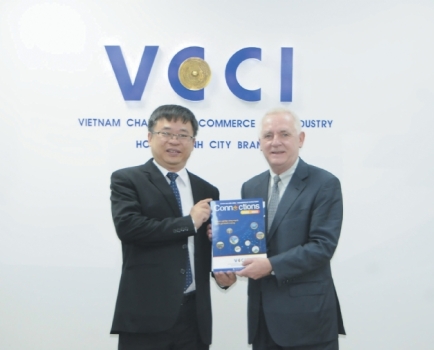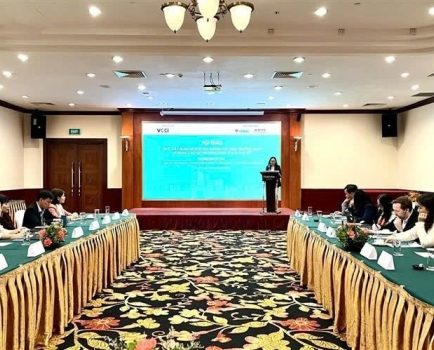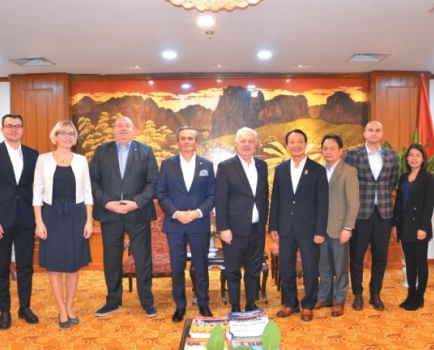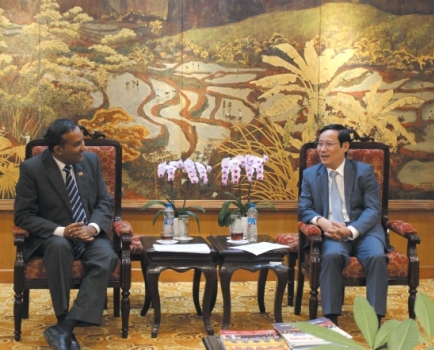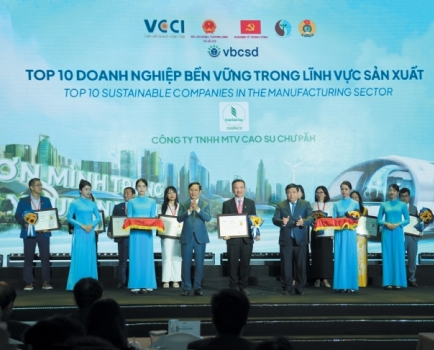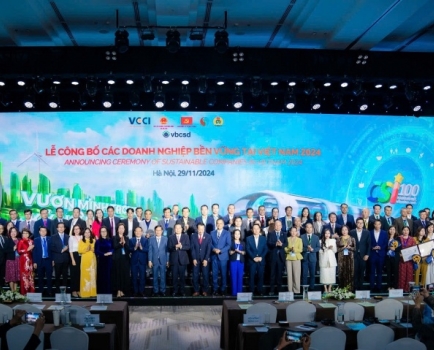Remove the 'bottleneck' for transshipment goods
Tue, 22 Aug 2023 13:35:00 | Print | Email Share:
In order to overcome the difficulties and challenges in transshipment cargo transportation activities, on the morning of July 18th, the Vietnam Chamber of Commerce and Industry (VCCI) and the Vietnam Automobile Transport Association (VATA) organized a seminar titled “Removing Bottlenecks in Transshipment Cargo Transportation”...
Accordingly, on the morning of July 18th, the Vietnam Chamber of Commerce and Industry (VCCI) in coordination with the Vietnam Automobile Transport Association (VATA) organized a seminar titled “Removing Bottlenecks in Transshipment Cargo Transportation”
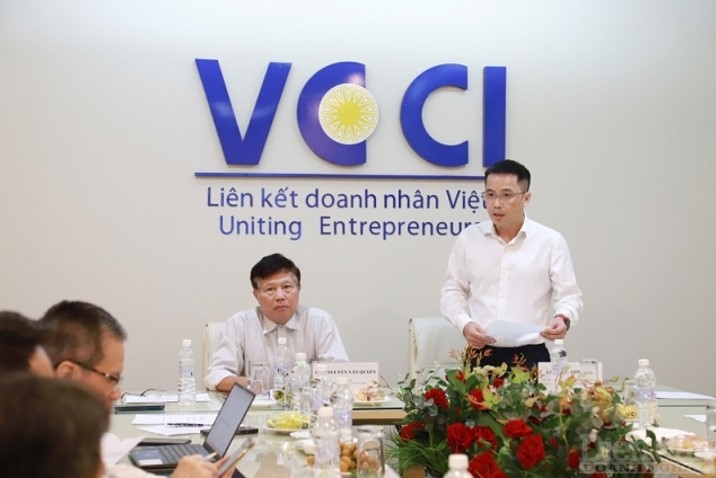
On the morning of July 18th, VCCI and VATA organized a seminar titled “Removing Bottlenecks in Transshipment Cargo Transportation”.
At the seminar, Mr. Nguyen Van Quyen, the Chairman of VATA, stated that despite always cooperating with state management activities and ensuring compliance with legal regulations during operations, transportation enterprises are still facing obstacles in transshipment cargo control procedures.
Specifically, according to Mr. Quyen, at the entry gate, goods are inspected by customs immediately after transit enterprises receive them from foreign cargo vehicles in the customs-monitored area. However, upon arrival at the exit gate, the goods are manually inspected, which takes a significant amount of time, sometimes 2-3 days. This situation poses various risks such as damage, increased loading and unloading costs, causing great concern among enterprises.
"If this situation is not addressed soon, it will create many difficulties for businesses, leading to increased logistics costs, reduced competitiveness of goods and services, and decreased operational efficiency of enterprises," Mr. Quyen shared.
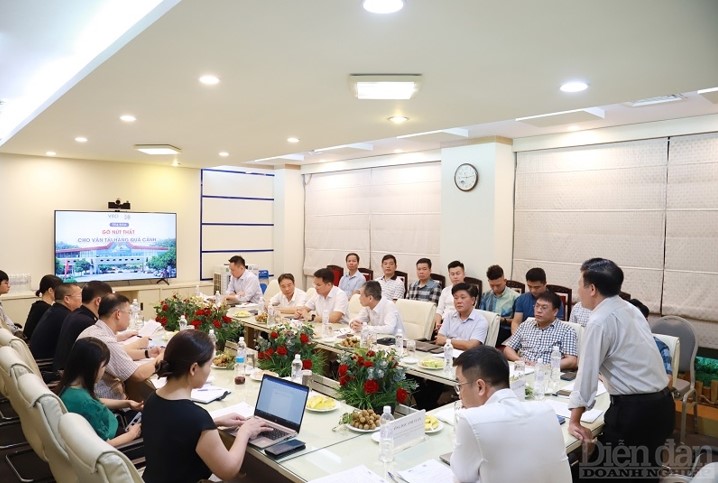
Overview of the seminar “Removing Bottlenecks in Transshipment Cargo Transportation”
According to Mr. Quyen, businesses hope that through this seminar, management agencies can gain an objective and multi-dimensional perspective, providing practical solutions to ensure that supervision activities do not impact business operations. This would create favorable conditions for transportation enterprises to contribute to the overall economic development.
Addressing the challenges and obstacles in current cargo transit procedures, legal expert Nguyen Manh Cuong mentioned that there are many shortcomings in the regulations for inspecting and penalizing transshipment cargo. Despite the fact that cargo containers are equipped with electronic chips for tracking their movement upon entry to the border gate, practical inspection activities, seal removal, and subsequent administrative penalties still occur. Notably, enterprises only handle transportation and proceed with formalities based on information provided by foreign cargo owners. They always ensure proper sealing. Therefore, the inspection and enforcement measures against these enterprises lack persuasiveness.
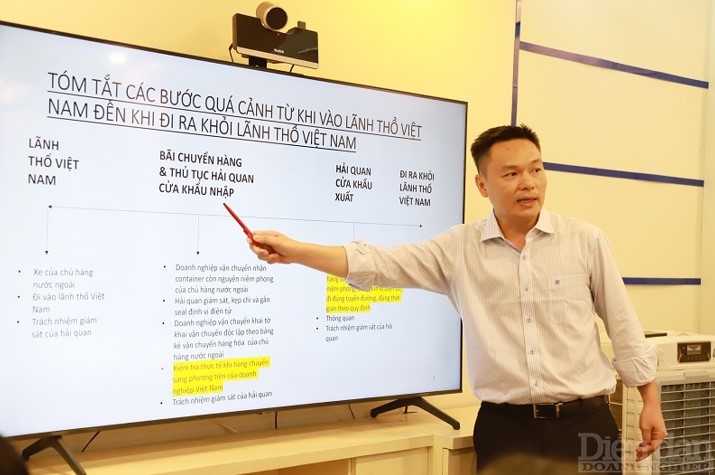
Lawyer Nguyen Manh Cuong - Representative of businesses sharing at the seminar about current legal obstacles.
From that standpoint, he suggested that the relevant authorities should establish a mechanism for inspecting goods at the entry gate before foreign cargo containers are transferred to Vietnamese transportation company vehicles. There should be no consideration for practical inspections at the exit gate. Real cargo inspections should be conducted using modern equipment, avoiding manual inspections.
In agreement with this perspective, the businesses also proposed that the General Department of Customs develop a plan to reassess customs supervision for transshipment goods. This approach should aim to implement tightly controlled and scientifically managed methods based on technology. This would enhance the effectiveness of customs supervision while ensuring the competitive edge of logistics businesses and maintaining Vietnam's position as an international cargo transshipment hub.
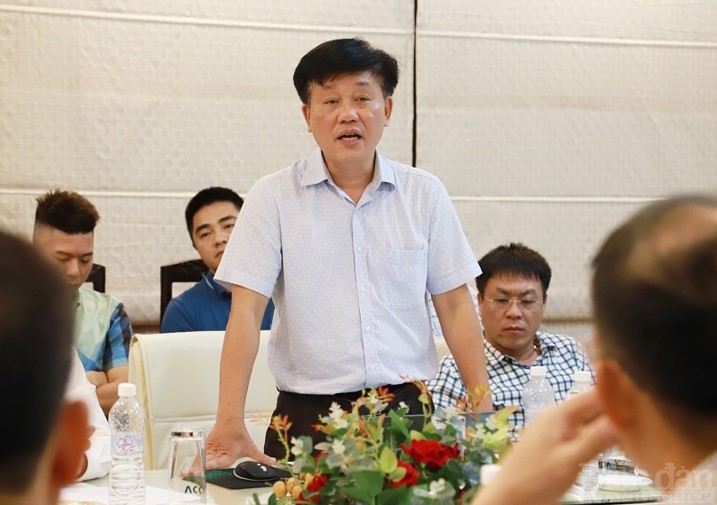
Mr. Tran Duc Nghia - Chairman of the Hanoi Logistics Association shared at the seminar.
According to Mr. Tran Duc Nghia, Chairman of the Hanoi Logistics Association, foreign cargo owners somehow find it perplexing that their goods passing through Vietnam's territory take only 3-4 hours or 20-36 hours, yet they must fully comply with regulations related to non-tariff barriers applied to imported goods... this is excessive inspection activity. In the past, there were times when customs authorities stopped hundreds of cargo containers for manual inspection, and recently, dozens of cargo containers were simultaneously halted for inspection at some border gates.
"We are not concerned about the number of dozens of containers stopped for inspection, but we worry about situations like in 2019-2020 when there were times when even hundreds of containers were held back. That is a disaster for Vietnam's position on the international cargo route," Mr. Nghia expressed.
According to Mr. Nghia, one of the frequent penalties imposed on transportation businesses is for inaccuracies in cargo declaration. Many businesses feel that "if there's an inaccuracy, there's a penalty," but the question is, "who should be penalized?" Businesses disagree with customs penalizing Vietnamese transportation enterprises.
Alongside the points raised, the seminar also heard from several businesses sharing about the existing and ongoing challenges, especially issues like incorrect cargo declarations, incorrect item names, and the difficulties and repercussions caused by the transshipment cargo inspection process.
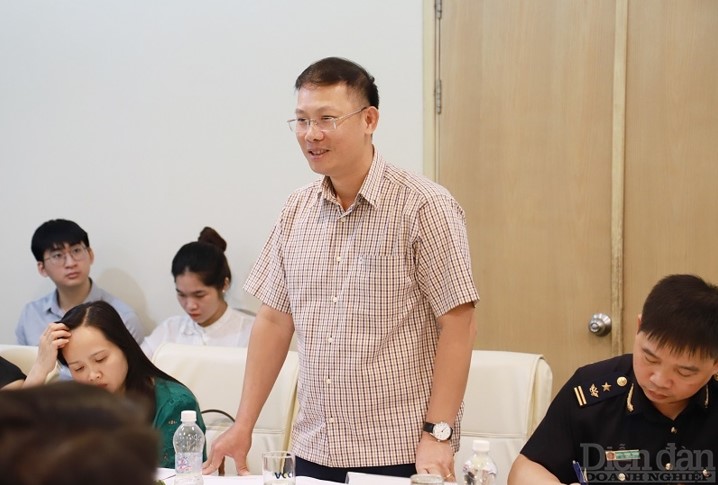
Mr. Do Huy Tho - Director of Customs Management Supervision Department, General Department of Customs, responds to the opinions of businesses.
In response to the feedback from businesses, Mr. Do Huy Tho - Director of Customs Management Supervision Department at the General Department of Customs, stated that the General Department of Customs has received the opinions and suggestions from businesses regarding the difficulties and obstacles raised, related to transshipment cargo. The General Department of Customs and the Ministry of Finance also consistently recognize that this sector has brought significant advantages to Vietnam in recent years. Therefore, they highly encourage and create conditions for businesses...
According to Mr. Tho, the customs authorities always determine not to conduct widespread inspections of goods unless there are signs of violations. Specifically, at the Chalo border gate in Quang Binh province, from the beginning of the year until now, there have been 12,736 declarations, and customs inspected 16 of them, detecting violations in 14 declarations. In Binh Phuoc, there were 3,829 declarations, over 5,400 containers were inspected, 17 declarations were checked, and 4 violations were found. In Lang Son, with 2,996 containers, customs inspected 8 containers and found 6 cases of violations. In Long An, there were 5,992 declarations, customs checked 23 declarations, and violations were discovered in 11 declarations.
"That is to say, the inspection rate of the customs authorities is very low, accounting for less than 1% of the total transshipment cargo lots. However, the rate of detecting violations is quite high," Mr. Tho shared.
Regarding the businesses' suggestion that penalties should be imposed on cargo owners instead of transportation companies, the representative of the Customs Management Supervision Department believes that the transshipment cargo transported by Vietnamese enterprises is authorized by cargo owners. When making customs declarations, businesses include a manifest that contains information about the cargo owner. This is also a challenge for businesses, but according to regulations, when authorized, it must be declared accurately...
Alongside the responses from the Customs Management Supervision Department, at the seminar, the representative of the Anti-Smuggling and Investigation Department also provided explanations to the opinions from businesses.
The agencies of the General Department of Customs have taken note of the opinions and proposals from businesses at the seminar. Along with the issues that have been clarified, these agencies will incorporate the feedback, report, and advise the leadership on finding solutions in the near future.
Summing up the seminar, Mr. Dao Anh Tuan - Deputy Secretary-General and Head of the Legal Department at VCCI, stated that the National Assembly and the Government consistently review and amend regulations that hinder business activities and economic development. Therefore, anything beneficial for the country and the economy must be suggested.
"Without proposing ideas, without advocating for change, waiting will also be difficult... Therefore, associations should also refer to the approaches of other countries in the world on this issue to provide recommendations to the management agencies regarding international practices. Vietnam needs to absorb what is applicable... we cannot let the prospect of one person's stomachache lead to the entire village being prescribed medicine...", Mr. Tuan shared.
Source: GIA NGUYEN (Business Forum Magazine).
By: Translator: LeAnh-Bizic
---------------------------------------------
Same category News :



